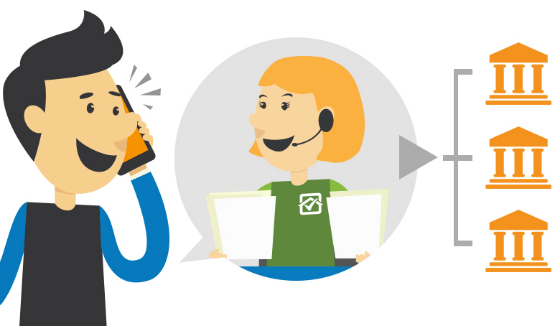Buying real estate property also takes some form of utang to make it happen. Instead of pouring all of your money on a single investment, it is financially wise to just pay the ideal down payment first, then the remaining amortizations later.
But utang can only be good for you if you know how to manage it. Control can be one effective way, but there are eight other habits that you may consider adopting before making a long-term million-peso debt commitment:
1. Paying things that you can afford in cash

Why: Four words: Credit card compound interest.
Sure it’s easy to pay for your lunch with your shiny card carrying a 3% local industry average monthly interest, but that P150 meal can quickly turn into P500, for example, if you do not pay off your bill for the first one, and could grow to P515 if you put it off for the next month, and P530 for the next month…well, you get the picture. That P150 bill could quickly balloon to P692, which is 4.6 times more than the original amount.
Now, imagine what your bill would look like if you depend on your credit card to pay for it. Even if your salary is more than enough to even cater to your vices and your amortizations, credit cards could easily trap you into just paying off the interest and not make a dent on the amount you truly owe.
2. Not borrowing money from Mommy/Daddy/your reliable loan shark to pay for your utang

Why: You’re just multiplying your debt. You’re also dwindling your parents’ retirement fund.
You don’t need an A in Finance to understand why this is irrational. By the time you have arrived at this decision, that debt has already accumulated interest. To pay it off, you’re going to get a loan that at maximum (if you’re not borrowing from Nanay or dear old Dad), could earn 20% in interest and will compound in the next month if you miss paying the second loan. And it’s an entirely new, but expensive cycle (see #1).
3. Not gambling your savings intended for your downpayment away on a get-rich-quick scheme

Why: It’s ALWAYS a scam.
Sometime ago, my mom almost fell for this popular networking company, and insisted on me and my siblings to pool P50,000 along with her savings so we can jointly invest in this “opportunity.” We had a big argument over that because we thought that it’s a pyramid scam. A month after, our suspicions were confirmed when the news reported about the company shutting their business down and running off with people’s money.
If a “business opportunity” sounds too good to be true, chances are they aren’t. If the money you have is really intended for a long-term goal, like a home purchase for example, put your blinders on and make sure the money is invested to reach that goal. If your savings is not enough for a downpayment, you can easily earn extra income by freelancing, or by doing these other financing hacks.
4. Exploring financing alternatives for your home loan

Why: A home loan with a slightly lower interest rate can mean HUGE savings on your future amortizations.
Although there are ample funding options available to Pinoys when it comes to purchasing their homes, we often settle on the most accessible and fuss-free ones. Mas mabilis, mas mabuti. Because of this way of thinking, we end up getting overwhelmed with how much the housing loan we have chosen actually costs us once we are a few amortizations deep into paying them.
As such, it is important to shop for housing loans before committing to a particular one. Because home loan interest rates aren’t transparent and fixed, a mere 0.2% increase in your P2 million loan at 4.2% interest for 20 years could cost you a little over P50,000, according to iMoney.ph.
5. Not keeping up with the Lopezes or the Tans

Why: They know that they can afford it. Can you?
An aunt of mine, who was doing well in her convenience store business at that time, decided to build a three-story mansion well-hidden in the outskirts of our pueblo (main city proper in Chavacano). She was so excited with how well her business has been doing that she took out a huge loan to purchase the land and fund the building of the property. Months after the grand house blessing held at the house, she got separated from husband number 2 and saw herself cutting corners on her already failing business.
Because the amortizations were way off her monthly income, she resorted to selling her home at a reduced price.
The great Filipino writer F. Sionil Jose wrote,
We are great show-offs… Yabang – that is what we are, and all that money expended on status symbols, on yabang. How much better if it were channeled into production.
6. Building an earning emergency fund solely for your amortization payments.

Why: Because you cannot really predict the future.
What if your company decided to lay you off? What if you need to resign because of reasons that will not allow you to commit to work (e.g. disability)? Anticipate this well in advance by smartly investing your emergency fund in earning financial instruments, like a mutual fund, for example. Not only that you have money set aside to cover amortization payments in case your main source of income has been cut off, your money actually grows to an amount that you can use to continue building your home equity.
7. Setting aside a savings fund

Why: Same scenario in #7.
Most first-time homebuyers get confused with the difference between “emergency fund” and “savings fund.” Some would even give up on knowing the terms entirely just because they can’t set aside too much from their take-home pay. But then again, you need to look into the crystal ball too and consider the possibility of you losing your main source of income. You still need to pay for Meralco, Maynilad, internet/cable connection, and other household expenses, you know.
What if you also got into an accident too (knock on wood three times)? Your savings fund can help diffuse your hospital costs and other big, unexpected expenses that would come along the way after you’ve signed the contract to sell.
8. Keeping your financial promise

Why: Because not paying off your other utang could drive you to foreclosure.
Getting a home loan is like taking bigger debt stretched over for at least a decade. If you add other unpaid debt to the amortization payment you need to make monthly, you are going to find yourself overwhelmed with debt and may eventually forced to either resell the home to a buyer who can assume your debt or worse, forgo payments entirely.
That is why it’s no use shoving your bills down the crevices of your sofa/drawer/(insert deep storage unit) to make your debt go away. Make a list of all your utang and pay off the big ones first, and then the smaller ones. If you do need to take on additional debt during the housing loan term, ensure that you can keep up with the payments before making that commitment.
Still can’t resist spending money intended for your home down payment? See how these overspenders do it.











